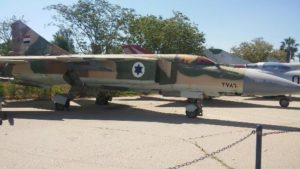 Jews’ Planes Bomb Arabs In First Raid
Jews’ Planes Bomb Arabs In First Raid
Four Try to Rescue Ambushed Convoy
60 Jews, Attacked on Trucks, Are Surrounded in Heaviest Battle Yet
By Fitzhugh Turner By Wireless to the Herald Tribune Copyright, 1948, New York Herald Tribune Inc.
JERUSALEM, March 27.-Jewish planes went into action today for the first time in the Palestine fighting when Arabs attacked a Jewish convoy of thirty-four trucks near Bethlehem. Four planes were engaged. Sixty survivors of the convoy force of ninety were reported tonight to be surrounded by Arab riflemen in a stone house near by.
The Jews were under heavy attack. The British Army abandoned rescue efforts until daylight, and the government feared there was little chance for their survival.
The fight followed Arab interception this afternoon of the convoy, which was en route back to Jerusalem after delivering supplies to the isolated Kfar Etzion colonies in the hills of Hebron.
Haganah said some of the trucks found safety in Kfar Etzion while Jews in the other left their vehicles and fought two miles along the road to reach the house on foot. Until darkness fell, the Haganah planes supported them, dropping the first aerial bombs used by Jews or Arabs in Palestine.
Heaviest Engagement
The fight, several miles from the nearest Jewish settlement, was the heaviest open engagement yet to occur in Palestine. An Army pilot who flew over early in the afternoon said two of the trucks were burning and Arabs in force were attacking the others.
Four Jewish Auster planes were circling and dropping small bombs, he said. A number of Auster two-seaters used by the British for training were sold by the Army recently to the Jewish Agency for Palestine, but the Agency said tonight it had no knowledge of any bombs.
The scene was the main highway leading south from Jerusalem, about eight to ten miles from here. The whole area was cut off from communications, but the thud of shells could be heard in Jerusalem at dusk over the rattle of the city’s own small-arms fighting. The shells presumably were fired by army units trying to halt the fight from a distance, using planes to direct artillery.
Two army ground forces tried to reach the area of the house later but met mines on the road and delayed rescue until morning. In Bethlehem, meanwhile, armed Arabs locked the entrance to the police station and instructed a dozen British constables there to remain inside and not attempt to interfere.
Shamos Pollack, British District Commissioner at Jerusalem, went to Bethlehem intending to ask the Arab Mayor, Eissa Bandak, to intercede. Arabs here said they doubted if any one would persuade the attackers to hold back. Later in the evening it was reported Jews were running short of ammunition.
The heavily armed Haganah trucks were manned by young Jews trained for convoy duty. Jewish girls sometimes serve in the work, but it was not known whether any women were in the party. The attackers were local villagers, farmers and national guardsmen who swarmed out of the hills and laid an ambush after the convoy had passed.
The Kfar Etzion bloc of four settlements is a Jewish strongpoint in purely Arab country and a thorn in the Arab flesh. The low buildings of the colonies dominate hilltops in their area and constitute a threat to Arab communications between Jerusalem and Hebron, a seat of Arab military strength. One of the first beetles in the strife was fought around the colonies in January, during which a Haganah foot patrol of thirty-five was killed to the last man.
Today’s convoy was the first in a month to reach the 500 or so Haganah members who man the colonies. The trucks left Jerusalem secretly at dawn with supplies and reinforcements and reached Kfar Etzion in the morning, turning back after unloading.
But Arabs had cleared the road of their own traffic and, according to the Army, had erected seventeen strong roadblocks between Kfar Etzion and Bethlehem. The convoy was stopped at the first not far from the colonies.
While Arabs along the road and Jews in the trucks exchanged fire a military armored car was sent to investigate. Arabs disabled it near by and nothing had been heard of its occupants tonight. Four Jewish armored cars coming to the rescue reached the Pools of Solomon just beyond Bethlehem, but were pinned down by Arabs, and a separate little fight was in progress there.
Shooting between Jews and Arabs occurred on other roads north and west of Jerusalem today, and in the city itself Haganah and the Irgun Zvai Leumi traded machine-gun fire with the Arab National Guard, with perhaps twenty casualties on both sides. Jewish mortar shells dropped near the Damascus Gate into the walled Old City at one stage in the affray.
Britain Denies Talks With U. S.
LONDON, March 27.-The Foreign Office denied today that the United States has pressed Britain to delay its plans to give up its mandate in Palestine and evacuate its troops from that country.
The Foreign Office spokesman’s denial was in reply to reports, prominently published in today’s newspapers here, of statements by President Truman and Michael McDermott, spokesman of the State Department.
[At Washington, Mr. McDermott said Friday night that he knew of no basis for the London newspaper reports that the United States intended to ask Britain to stay on in the Holy Land, The Associated Press said.]